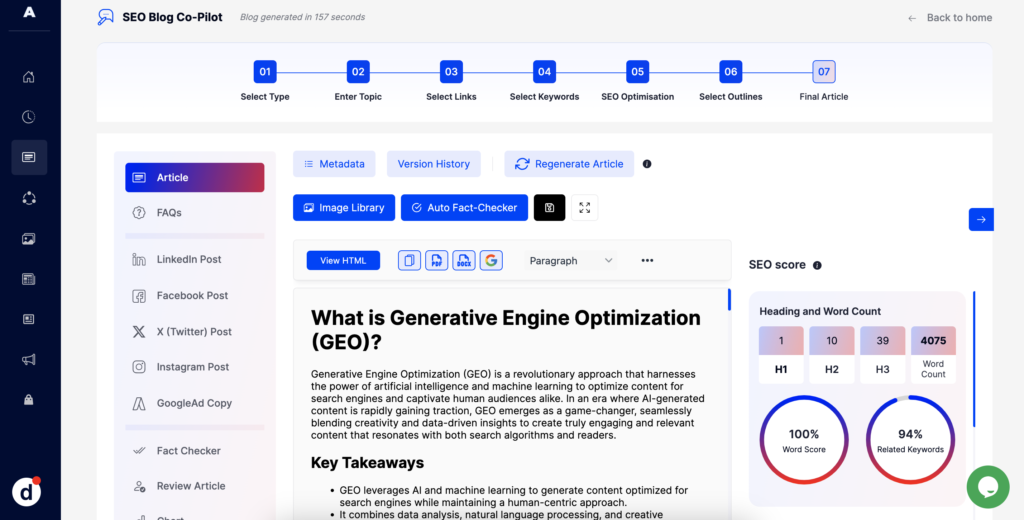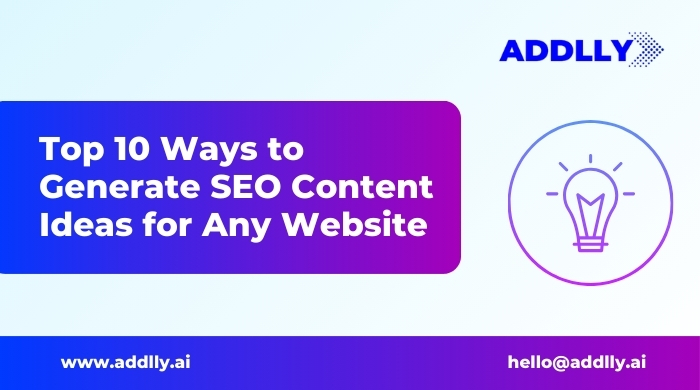Content is the lifeblood of any successful website, attracting, engaging, and converting visitors into loyal customers. However, generating fresh, relevant content ideas can be challenging. This guide provides the top 10 ways to find the best SEO content ideas for any website, regardless of your industry or niche.
Quick Summary Powered by Addlly AI
Toggle1. Utilize Keyword Research Tools

The Power of Long-Tail Keywords
Long-tail keywords are specific phrases that can help you get more targeted visitors. For example, “easy gluten-free cookie recipes” is more specific than just “cookies.” These longer phrases often have less competition, making it easier for your website to rank higher on Google.
Semantic Search
Semantic search means search engines try to understand what users really mean when they search. This helps you create content that answers people’s questions better. By using tools that consider semantic search, you can find related topics and keywords that match what users are looking for.
From Keywords to Content Ideas
Once you have your keywords, you can turn them into great content ideas. For example, if “eco-friendly fashion” is a popular search, you could write about sustainable fabrics or interview designers who make eco-friendly clothes. Good keyword research helps you find topics that people are interested in but aren’t well covered yet.
Remember, creating high-quality content is important for SEO. While AI can help with content creation, make sure to review and personalize it. The length of your blog posts matters too, but quality is more important than quantity. By following these tips, you can improve your Google rankings and attract more visitors to your site.
2. Create Topics Around Your Customers

Understanding and catering to your customers’ needs, interests, and pain points ensures your content resonates.
Understanding Your Audience
Get to know your audience using tools like Google Analytics and social media insights. This information helps you understand who your readers are and what they like. By knowing your audience better, you can create content they’ll find useful and interesting. AI-powered SEO tools can help analyze this data more efficiently.
Identifying Customer Pain Points
Create content that solves problems. Look at customer surveys, online forums, social media, and reviews to find common issues. When you address these problems in your content, you become a trusted source of information. AI content writing tools can help you generate ideas and content that target these pain points effectively.
Content Mapping
Match your content to different stages of the customer journey. For example:
- Awareness stage: General information
- Consideration stage: More detailed content
- Decision stage: Product comparisons and reviews
This approach ensures you’re providing the right information at the right time. Using AI for SEO can help streamline this process and improve your content strategy. Remember to focus on AI-generated content readability to ensure your audience can easily understand and engage with your content.
3. Educate with Tutorials and Case Studies

Educational content like tutorials and case studies empowers customers with knowledge and insights.
Engaging Through Tutorials
Offer step-by-step guides in various formats to engage and inform. How-to videos are particularly popular and effective. Tutorials can be in the form of blog posts, videos, infographics, or even interactive content. The key is to provide clear, concise, and actionable instructions that help your audience achieve their goals. Tutorials can also include visual aids, such as screenshots or diagrams, to enhance understanding.
Case Studies: Showcasing Success
Highlight real-world examples of how your products or services solve problems. Use real data and customer testimonials for credibility. Case studies are powerful tools for demonstrating the effectiveness of your products or services. They provide social proof and allow potential customers to see how your offerings have helped others achieve their goals. A well-crafted case study should include a detailed description of the problem, the solution provided by your product or service, and the results achieved.
4. Analyze Competitor Content

Analyzing competitor content provides insights into successful strategies and content gaps.
Identifying Competitors
Use tools like SEMrush and Ahrefs to find competitors based on shared keywords. These tools can provide detailed information about your competitors’ online presence, including their top-performing content, backlink profiles, and keyword rankings. Identifying your competitors allows you to benchmark your own content against theirs and identify areas where you can improve.
Understanding Competitor Strategies
Look at the types of content they produce, their posting frequency, and engagement rates. BuzzSumo is useful for this analysis. By understanding your competitors’ SEO content strategies, you can identify what works well in your industry and adapt those strategies to fit your own brand. Pay attention to the types of content that generate the most engagement, such as blog posts, or videos, and consider how you can create similar content with your own unique twist.
Discovering Content Gaps
Find topics competitors haven’t covered or areas where their content falls short, and create superior SEO content in those areas. Content gaps represent opportunities for you to provide valuable information that your competitors may have overlooked. Use tools like Ahrefs’ Content Gap analysis to identify keywords and topics that your competitors are ranking for but you are not. Create high-quality content that addresses these gaps and provides more comprehensive information than your competitors.
5. Monitor Online Forums, Industry Blogs, and Social Media

These platforms provide real-time insights into your audience’s interests and concerns.
Online Forums
Forums like Quora and Reddit reveal common questions and topics of interest. Turn popular threads into informative posts. Online forums are a great source of fresh content ideas because they reflect the real-time concerns and interests of your target audience. Pay attention to frequently asked questions and popular discussions, and use them as content inspiration for your new SEO content ideas. You can also participate in these forums to engage with your audience and establish your brand as an authority.
Industry Blogs
Stay informed on trends and innovations by reading industry blogs. This can inspire deeper dives into specific topics. Industry blogs provide insights into the latest trends, challenges, and opportunities in your field. By regularly reading these blogs, you can stay up-to-date with industry developments and create content that addresses current issues and trends. Consider subscribing to industry newsletters or using RSS feeds to keep track of new blog posts and articles.
Social Media Discussions
Monitor social media to understand customer preferences and trends. Social listening tools like Hootsuite are invaluable. Social media platforms are dynamic environments where users share their opinions, experiences, and questions. By monitoring social media discussions, you can identify trending topics and popular hashtags that are relevant to your audience. Use social listening tools to track mentions of your brand, competitors, and industry keywords, and then use this information to create timely and relevant content.
6. Interview Industry Experts and Influencers

An often overlooked aspect is expert interviews, which can provide unique insights and enhance credibility.
Identifying Experts
Use tools like BuzzSumo to find relevant industry experts and influencers. Influencers and industry experts have established credibility and a loyal following in your niche. By interviewing them, you can provide your audience with valuable insights and tap into their expertise. Tools like BuzzSumo and Klear help to identify influencers based on their reach, engagement rates, and relevance to your industry.
Conducting Interviews
Prepare thoughtful questions and choose the best format to share interviews, such as blog posts, podcasts, or videos. Conducting an effective interview involves thorough preparation. Research the interviewee’s background, expertise, and previous work to craft thoughtful questions that will elicit valuable insights. During the interview, encourage open discussion and allow the conversation to flow naturally. After the interview, choose the best format to share the content with your audience, whether it’s a written blog post, an audio podcast, or a video.
Maximizing Impact
Repurpose interviews into various content forms to extend reach and engagement. Interviews can be a rich source of content that can be repurposed into multiple formats. For example, a video interview can be transcribed into a blog post, with key quotes highlighted for social media. You can also create infographics, slideshows, or summary articles that capture the main points of the interview. By repurposing interview content, you can reach a wider audience and maximize the impact of the insights shared.
7. Repurpose Existing Content

Repurposing content extends its lifespan and reach, making efficient use of your best materials.
Identifying Content for Repurposing
Focus on evergreen, high-performing content. Evergreen content is content that remains relevant and valuable over time. Tools like Google Analytics help to identify your top-performing content based on metrics like traffic, engagement, and conversions. These high-performing pieces are ideal candidates for repurposing because they have already proven their value to your audience.
Ways to Repurpose
There are many ways to repurpose content to reach different audiences and provide fresh value. For example, a comprehensive blog post can be broken down into a series of short posts, creating a content series that keeps your audience engaged over time. You can also turn a popular blog post into a video tutorial or a podcast episode, catering to different content consumption preferences. Infographics are another great way to repurpose content, as they provide a visual summary that can be easily shared on social media. Additionally, updating old content with new information, statistics, and insights can make it relevant again, boosting its SEO performance and attracting new traffic.
8. Stay Updated with Industry News

Timely content based on industry news keeps your site relevant and authoritative. Industry news provides a wealth of content ideas. According to the Content Marketing Institute, 78% of consumers trust brands that produce custom content, suggesting that timely, industry-specific content can enhance your brand’s credibility and trustworthiness.
Following Reliable News Sources
Staying updated with industry news starts with identifying and following reliable news sources. These can include industry publications, trade associations, news websites, and influential blogs. Google Alerts and Feedly can help you monitor these sources and stay abreast of the latest developments. By curating content from these reliable sources, you can ensure that your audience receives accurate and up-to-date information.
Translating News into Content
Translating industry news into content requires a keen eye for relevance and a creative approach. Consider how the news affects your audience and how you can provide value through your content. For instance, a new regulation might inspire a blog post explaining its implications, while a technological breakthrough could be the topic of an informative podcast episode. By providing analysis, context, and actionable advice related to industry news, you can position your website as a go-to resource for timely information.
9. Use Trending Topic Discovery Tools

These tools help identify hot topics for timely, relevant content. Trending topics represent what’s currently capturing the public’s interest. By creating content around these topics, you can tap into this interest, driving organic traffic and engagement to your site. Furthermore, timely content shows that your brand is up-to-date, enhancing your credibility and relevance in the eyes of your audience.
Discovering Trends with Tools
Several tools can help you discover trending topics in your industry or niche. Google Trends, for instance, shows the popularity of search queries over time, while BuzzSumo highlights the most shared content for a particular keyword or topic. Social media platforms like Twitter also feature trending topics, giving you a real-time look at what’s generating buzz online. These tools can provide valuable insights into what your audiences are interested in right now.
Translating Trends into Content
Once you’ve identified a trending topic, the challenge is to translate it into engaging content. Consider how the trend relates to your industry, your brand, and your audience. Can you provide a unique perspective, a deeper analysis, or a practical application? If there’s a trending topic about a new technology, you could create a blog post explaining how it works, its benefits, and its potential impact on your industry. Remember, the goal is to add value for your audience, not just jump on the bandwagon.
10. Share Resources, Tips and Actionable Advice

Sharing resources, tips, and actionable advice is a proven way to provide value to your audience, foster trust, and establish your website as a go-to source of information. This type of content not only enriches your audience’s knowledge but also empowers them to take informed actions.
The Power of Practical Content
Practical content that provides actionable advice or resources is highly valued by audiences. According to a study by the Content Marketing Institute, instructional content is the most popular form of content, with 77% of internet users reading blogs for self-education. By offering solutions, tips, or resources, you can address your audience’s needs and position your website as a reliable source of information.
Creating Resourceful Content
Resourceful content can take many forms, from how-to guides and tutorials, to resource lists and tool recommendations. The key is to ensure the resources are relevant to your audience, easy to understand, and actionable. Resources can also be curated from various sources, offering your audience a comprehensive overview of a topic.
Offering Actionable Tips
Offering actionable tips means providing practical advice that your audience can easily apply. Whether it’s a blog post offering productivity hacks, a video demonstrating a technique, or an infographic sharing health tips, make sure each piece of advice is clear, specific, and achievable. Actionable tips can also include step-by-step instructions, checklists, or templates that help your audience implement the advice immediately.
Enhancing Engagement with Interactive Resources
Interactive resources like quizzes, calculators, or interactive infographics can enhance engagement and make your content more memorable. Research has shown that interactive content is twice as effective as static content in educating the audience. By combining practical advice with interactive elements, you can create a more engaging and effective learning experience for your audience. For example, an interactive SEO checklist can help users evaluate and improve their website’s SEO in real-time.
Use Addlly AI to Generate SEO Optimized Content

Addlly uses AI to streamline and enhance content creation, optimizing for SEO and audience engagement.
Understanding Addlly AI
Addlly AI is a no-prompt Gen AI-powered tool designed to streamline and enhance the content creation process. It uses sophisticated algorithms and natural language processing techniques to generate SEO-friendly content that resonates with your target audience. Whether you’re crafting blog posts, product descriptions, or social media posts, Addlly AI can help you create compelling, optimized content with ease.
Creating Content Made Easy
1-Click Blog Writer
The 1-Click Blog Writer feature is a game-changer for anyone who needs to produce high-quality blog posts quickly. With just a single click, you can generate a complete blog post that is not only well-written but also optimized for SEO. This tool leverages advanced algorithms to understand your topic and audience, ensuring that the content it produces is relevant and engaging. Whether you need a detailed article on a complex subject or a quick post to keep your blog active, the 1-Click Blog Writer can handle it all, saving you hours of writing and research time.
Social Media Post Generator
In the fast-paced world of social media, creating engaging content consistently can be a challenge. The Social Media Post Generator by Addlly AI takes the guesswork out of social media marketing. This tool helps you craft compelling posts tailored to different platforms, whether it’s Facebook, Twitter, Instagram, or LinkedIn. It understands the nuances of each platform, such as character limits and popular hashtags, and ensures your posts are optimized for maximum engagement. By using this generator, you can maintain a consistent social media presence without the stress of constantly coming up with new ideas.
SEO Optimization
One of the standout features of Addlly AI is its ability to optimize content for search engines. It considers various SEO factors like keyword density, readability, and semantic richness. For instance, Addlly AI can suggest relevant keywords that will help your content rank higher in search engine results. It also optimizes headlines, meta descriptions, and tags to ensure your content is easily discoverable. This means that not only will your content be engaging for readers, but it will also attract more organic traffic, boosting your website’s visibility and performance.
Real-World Success Stories
Want to see how Addlly AI works in real situations? Check out the IMDA Gen AI Sandbox case studies. These examples show how different businesses have used Addlly AI to improve their content and get better results online.
Conclusion: Empowering Your Website with Effective SEO Content Ideas
These strategies offer a comprehensive approach to generating the best SEO content ideas, ensuring your website remains dynamic, engaging, and valuable to your audience. Leveraging tools like Addlly AI can significantly enhance your content creation process, driving traffic, and boosting your online visibility. By understanding your audience and staying updated on trends, you can create a content strategy that truly resonates and achieves your online goals.
The importance of content in today’s digital landscape is not just about filling your website with words—it’s about providing value, solving problems, and building connections. And with the right content ideas, you can turn your website into a powerful tool that drives traffic, fosters engagement, and boosts your online visibility.
So, whether you’re a seasoned content creator or just starting out, these strategies offer a roadmap to content creation success. They invite you to delve deeper, think creatively, and continually adapt to the ever-changing digital landscape. As you implement these strategies, remember that the most effective content is not just optimized for search engines—it’s optimized for your audience. After all, behind every search query is a human being seeking information, solution, and connections.
Author
-
As the seasoned Content Editor at Addlly.ai, my 15-year journey in editorial sharpens every piece of content to perfection. With a focus on clarity, brand voice alignment, and SEO enhancement, I ensure each publication meets the highest standards. My collaboration with writers is about elevating their work, leveraging insights from the marketing world to deliver content that truly resonates.
View all posts


